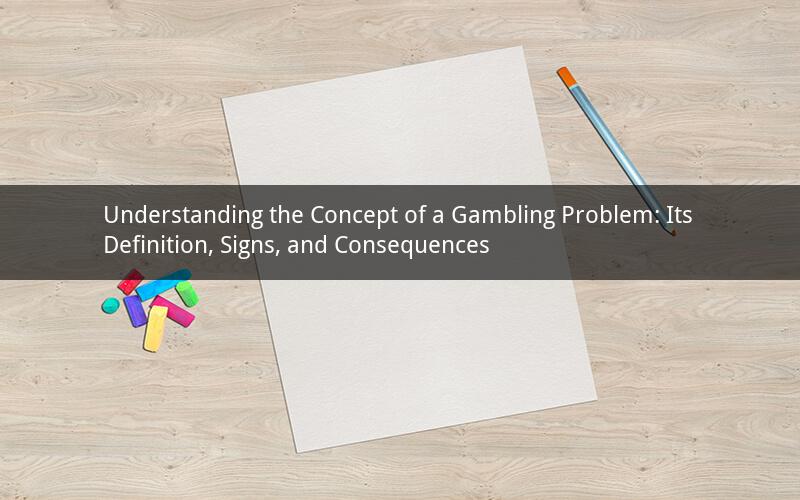
Gambling has been a part of human culture for centuries. It's a pastime that can be enjoyed in moderation and bring joy and excitement to those who engage in it. However, when gambling becomes a problem, it can lead to severe consequences in an individual's life. In this article, we will delve into what is considered a gambling problem, its signs, and the consequences it can have on an individual's life.
What is considered a gambling problem?
A gambling problem is a condition where an individual experiences difficulty in controlling or stopping their gambling behavior, which can result in negative consequences. This problem can manifest in different forms, including financial, emotional, and social issues. According to the American Psychiatric Association (APA), a gambling problem is classified as a gambling disorder if the individual experiences at least four of the following symptoms over a 12-month period:
1. Needs to gamble with increasing amounts of money to achieve the desired excitement.
2. Is restless or irritable when attempting to stop, reduce, or cut back on gambling.
3. Has made repeated unsuccessful efforts to control, cut back, or stop gambling.
4. Is often preoccupied with gambling, such as planning the next gambling venture or reliving past gambling experiences.
5. gambling was taken up to relax, reduce feelings of guilt, anger, or depression.
6. After losing, gambling is often continued in an attempt to recoup losses.
7. Has jeopardized or lost a significant relationship, job, or educational or career opportunity because of gambling.
8. Continued gambling despite knowing it has resulted in other mental or physical health problems.
Signs of a gambling problem
Identifying a gambling problem can be challenging, as the symptoms may vary from person to person. However, some common signs include:
1. Spending a significant amount of time and money on gambling activities.
2. Borrowing money to finance gambling activities or using credit cards to pay for gambling debts.
3. Hiding gambling activities from family and friends.
4. Experiencing financial problems due to gambling, such as missing rent or mortgage payments.
5. Feeling guilty, anxious, or depressed about gambling.
6. Prioritizing gambling over other responsibilities and activities.
7. Continuing to gamble despite knowing the negative consequences.
Consequences of a gambling problem
The consequences of a gambling problem can be devastating. Here are some of the potential outcomes:
1. Financial problems: Gambling can lead to significant financial losses, which may result in debt, foreclosure, or bankruptcy.
2. Relationship problems: A gambling problem can strain relationships with family, friends, and romantic partners, leading to arguments, emotional abuse, and even separation or divorce.
3. Emotional and psychological problems: Gambling can lead to feelings of guilt, anxiety, depression, and low self-esteem.
4. Social problems: A gambling problem can result in social isolation, as the individual may avoid social gatherings or spending time with loved ones.
5. Legal problems: Individuals with a gambling problem may engage in illegal activities to fund their gambling habits, such as theft or fraud.
Frequently asked questions about gambling problems
1. Q: Can anyone develop a gambling problem?
A: Yes, anyone can develop a gambling problem, regardless of age, gender, or background. Risk factors include mental health disorders, impulsivity, and a family history of gambling.
2. Q: How can I tell if I or someone I know has a gambling problem?
A: Look for signs such as spending a significant amount of time and money on gambling, hiding gambling activities, experiencing financial problems, and prioritizing gambling over other responsibilities.
3. Q: Is it possible to overcome a gambling problem?
A: Yes, it is possible to overcome a gambling problem with the right support and treatment. Many individuals have successfully recovered from gambling addiction through therapy, support groups, and self-help strategies.
4. Q: What treatment options are available for gambling problems?
A: Treatment options include therapy, support groups, and self-help strategies. Therapy may include cognitive-behavioral therapy (CBT), which helps individuals recognize and change negative thoughts and behaviors. Support groups, such as Gamblers Anonymous, provide a community of individuals who share similar experiences and offer support.
5. Q: Can gambling problems affect other aspects of a person's life?
A: Yes, gambling problems can have a profound impact on an individual's life, affecting their financial, emotional, social, and legal well-being. It is essential to address the problem to mitigate the negative consequences.